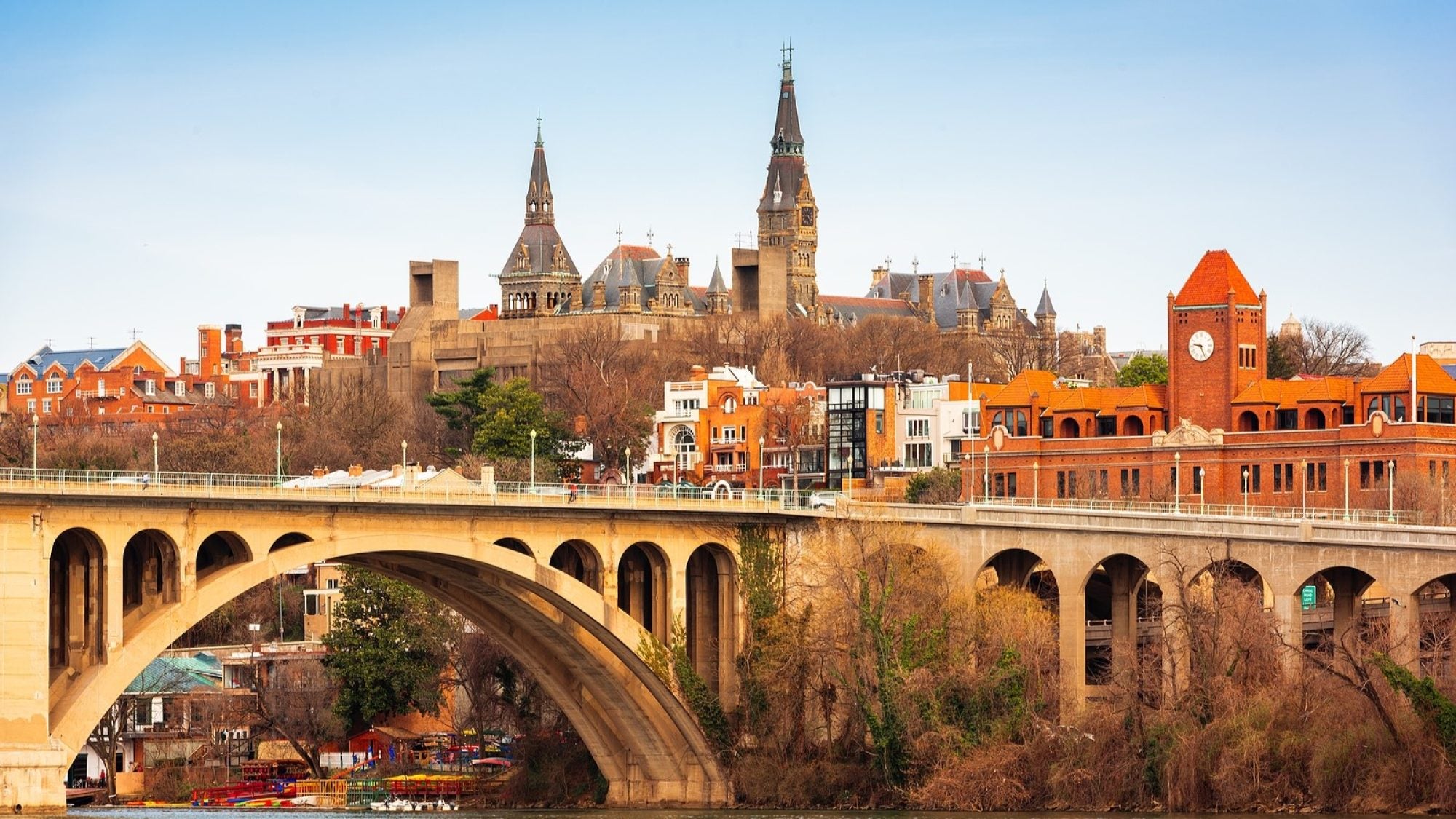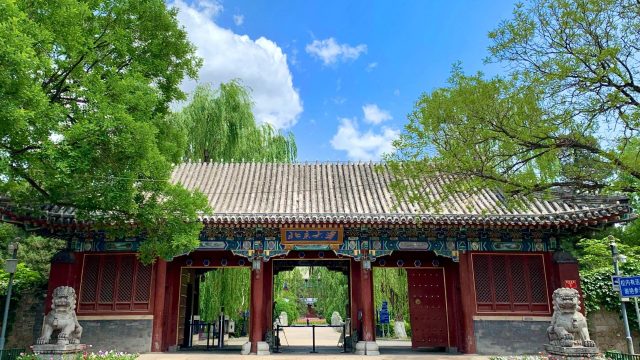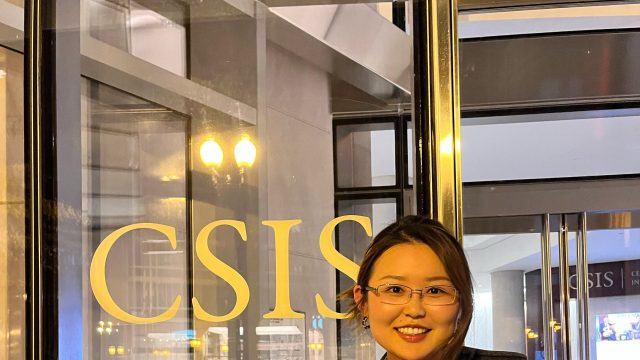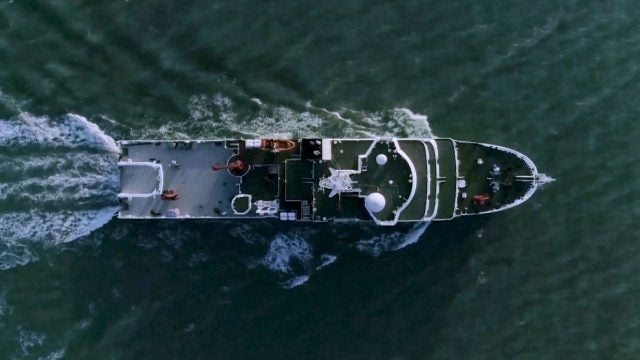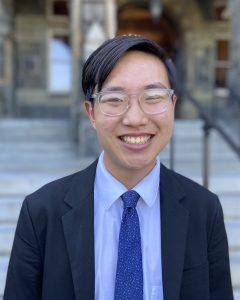 Brandon Wu is a first year accelerated MASIA student from Houston, Texas who is concurrently finishing the last year of his undergraduate degree in International Political Economy at Georgetown’s SFS and pursuing a Global Human Development Certificate. Brandon is currently serving as a Pathways intern with the Export–Import Bank’s Office of External Engagement, where he primarily assists with stakeholder management, including the organizing of EXIM’s Annual Conference and all foreign official visits to the Bank’s headquarters. He has previously also worked at the Maritime Administration’s Office of International Activities and Department of Homeland Security’s Office of Intelligence and Analysis. Outside of the classroom, Brandon is a member of the MASIA Diversity, Equity, and Inclusion Committee!
Brandon Wu is a first year accelerated MASIA student from Houston, Texas who is concurrently finishing the last year of his undergraduate degree in International Political Economy at Georgetown’s SFS and pursuing a Global Human Development Certificate. Brandon is currently serving as a Pathways intern with the Export–Import Bank’s Office of External Engagement, where he primarily assists with stakeholder management, including the organizing of EXIM’s Annual Conference and all foreign official visits to the Bank’s headquarters. He has previously also worked at the Maritime Administration’s Office of International Activities and Department of Homeland Security’s Office of Intelligence and Analysis. Outside of the classroom, Brandon is a member of the MASIA Diversity, Equity, and Inclusion Committee!
Why did you choose MASIA, and what makes it stand out especially as an accelerated degree program?
The reason that I chose MASIA and the reason that I believe it is such a standout program especially as an accelerated student is because it is so practically focused. We’re not just memorizing authors and theories, we’re taking the things we learned from current events and applying them to a variety of contexts. Personally, the first classes you take with your cohort are some of the most meaningful classes I’ve taken at Georgetown because we were practicing public speaking and debate, learning how to write policy memos, and applying IR theory to contexts on the ground across Asia. It was also a great bridge for taking some of the broader skills I learned in non-regional, generalist context and applying that to Asia, a continent where I could see myself working long-term.
What has been your favorite class that you have taken while at MASIA?
I really appreciated Dr. Tajima’s International Political Economy: Asia class. It was great not just because it was directly tied to my own academic and career interests, but also the way that he taught the class. We really explored the intuition behind why growth happened in Asia in certain countries and not others or the drivers of inequality and poverty in certain areas. Those types of big questions were left out of my broader undergraduate courses that I feel like have been really nice in grad school. Even just doing interpretation of regression that isn’t so math heavy was also very nice.
What are you looking forward to this semester?
I am looking forward to strengthening my connections with my cohort members. As a senior I think there’s been times I’ve had to pick but I think that especially next year, as just a master’s student it should be great to build stronger connections with both my cohort and the one under me. A lot of cool opportunities also arise from MASIA, like the briefing we had with the Defense Intelligence Agency, and I’m looking forward to taking advantage of more of those opportunities.
What other options did you consider besides MASIA?
I definitely considered other Georgetown programs. For a moment I seriously considered the data science and analytics programs as well as the MSFS program, but I think for me the regional concentration on Asia makes sense for the work that I want to do long term. I also think that being a smaller program that is more close knit, the fact that I can confidently say one thing about each of my cohort members is something my friends in other programs may not be able to do. Building those stronger connections makes it feels more like a master’s program instead of just taking more classes for an extra year, which I think truly makes the difference. There also aren’t harsh curves and getting into most MASIA classes is not extremely difficult, so in that sense it doesn’t feel like I’m competing against my other classmates.
How was the transition to MASIA, especially while still an undergraduate student?
Something our director talks about from day one is imposter syndrome. For me, realizing that everyone brings something different and new to the table is what prevented that from being as bad as it could have been. There’s people in my program who have worked in government in Japan and the US or who have done amazing NGO work, and there are people who just graduated last May or who are like me that don’t have as much work experience. I think that diversity and perspective is something I appreciated, but it was definitely a change.
I also took many quantitative heavy classes for the last few years of IPEC, so getting hit with 300 pages of reading was a big adjustment. But it’s still been nice because the content has been meaningful and it hasn’t felt like I am reading just to read.
Do you have advice for other Georgetown students who are considering applying to MASIA?
Doing introspection is something that is so underrated, but it is also exceptionally hard to explain how to do. It is really just sitting with your thoughts and then considering if this is a career path I could see myself doing work in for the next three to five years, and then finding the program that best fits that is very important. The advice I also give so often is do not do graduate school just because you do not know what else to do. Especially for law school, do not invest that amount of money if you’re not dead set on becoming a lawyer. For me, finding that resolve and deep interest in this area of work is the biggest thing to consider, and the best advice I can give in deciding to apply for MASIA.
Is there any advice you have for the application specifically?
Be very specific. Think through what aspects of your identity tie into your work, but at the same time, read your essay out loud and if any student that matches your profile could have written that, chances are you should probably narrow it and make it more specific to your work, interests, and background.
What do you hope to do with your degree once you graduate?
I hope to pursue public service and work in the US government, maybe in the areas of development or economics. I think the skills I am learning through the program really apply to those fields, but I’ve also thought about working on a political campaign doing foreign policy work, and even working abroad in Asia. A lot is on the table, which is one of the virtues of the MASIA program.
